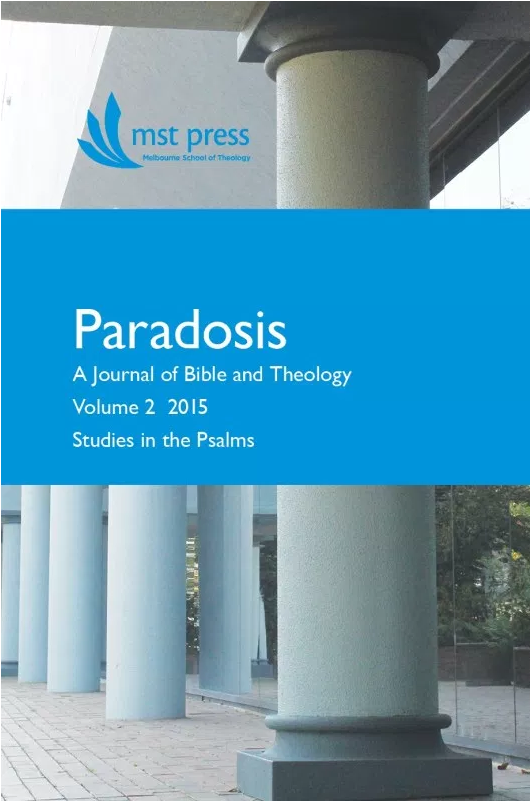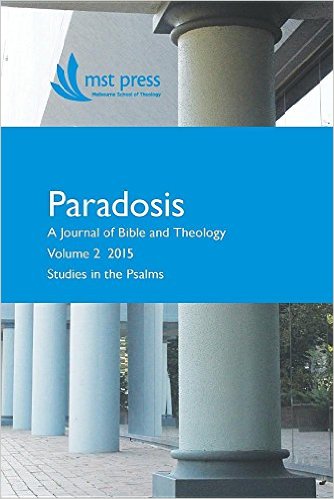Psalm 119 is kind of infamous, isn’t it? It’s by far and away the longest of them all, yet by reusing its Law/Torah vocabulary systematically in each new stanza, it gives us that feeling we get where a public speaker turns a five-minute point into a thirty-minute talk. (Those of you who were at the same public function as me last night, any resemblances to the speaker there are purely coincidental.)
In my latest biblical quest, that of reading our canonical books in the Greek Old Testament (OT) or Septuagint (LXX), I have been making heavy weather of reading the Psalms, proving unable to keep up with the teaching schedule in my Psalms subject just completed at Melbourne School of Theology. I’ve been lodged just in Psalm 119 for two weeks, just finishing this morning.
It still is not an easy psalm. Just how deliriously joyful can the study of the Law be? For one thing, we probably need to broaden our understanding of ‘law’ and the similar terms used so often in the psalm. Another of this often reused set of words is, well, ‘word’, and perhaps that isn’t a bad one to focus on. The thing prized here is not just the set of prescriptions contained in our Pentateuch between Exodus and Deuteronomy. It is really “every word that comes from the mouth of God,” that is, every indication of his nature, his will, and his attitude toward us. It assumes that God has taken the trouble to let us know what he thinks of us and what he wants from us. And that’s inherently precious, and naturally to be celebrated. It’s a claim that God reaches out to us across the vast ontological gulf that naturally separates us. That’s a source of hope.
Beyond that important principle, which can help us understand a potentially inscrutable psalm, I have found a few things that help me appreciate it more:
- This I knew already, but half the fun of this psalm on a literary level is its acrostic acrobatics. Each stanza has eight lines, and in Hebrew, each of those eight lines begins with the Hebrew letter designated in the heading. This involves some linguistic tricks that, I’m sorry to say, only Hebrew readers really get to enjoy.
- Along with the parallelism that is so obvious within each verse, I notice that pairs of neighbouring verses often closely parallel one another, needless to say with plenty of Hebrew word fun along the way. Here are verses 169 & 170:
- Let my cry come before you, O Lord;
- Give me understanding according to you word!
- Let my plea come before you;
- Deliver me according to your word.
- The psalm is a microcosm of every other psalm genre. There is praise, of course, but there is lament over suffering, pleading for intervention, expressions of confidence, ‘imprecations’ or cursing of evil people, thanksgiving for God’s intervention and help, in a word all the different kinds of discourse we find elsewhere in the psalms. I won’t list examples, being under time pressure (as always), but read a few lines and you’ll see what I mean.
- On a similar note, the psalm is very personal. V. 149 pleads, “Hear my voice, Lord, according to your mercy, and in keeping with your judgment, let me live” (from the Greek). It’s all like that: intimate, raw and real, notwithstanding the device of mentioning God’s ‘law’ by some synonym in every verse.
- As a curiosity, I don’t actually know how we got our English numbering system; I have a vague sense that the number shapes are thanks to Arabic somehow. But I noticed that the LXX used what looks like a final-form sigma for six, then a zeta for seven, then an eta for eight. That can’t be coincidental, can it? But I’m revealing a gap in my education there. Someone better informed can add a comment telling us all where our numbers come from.
- Finally, the Greek of the psalm keeps using the term ‘melete‘ (with a long last ‘e’), which means something like study or close scrutiny. “Your commandments are my melete,” says v. 143. For me, one of the best ways to relate to God is through Bible study and reading, but I worry that that might be some poor egghead substitute for real, spiritual interaction with God, which leads me to a final comment.
I think that one reason that we struggle to appreciate this psalm might be, aside from a much lower tolerance of repetition than an ancient Jew, that we read the ‘law’ references in Pharisaic terms. “The letter kills,” we feel, “but the spirit gives life” (2 Cor. 3:6). This expresses a tension inherent to the spiritual life of the Christian, and the pendulum of church practice has swung between these two extremes. But Psalm 119 reassures us that the two don’t have to be mutually exclusive. The letter is capable of serving the spirit as well as resisting the spirit.
Studying your Bible can be a spiritual act, a devotional thing to do, a window on the will of God. It need not be a dead letter.


